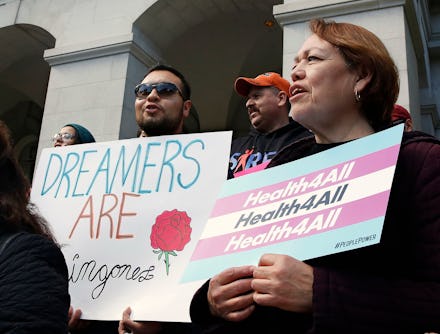California just became the first state to give undocumented young adults healthcare

On Tuesday, July 9, California governor Gavin Newsom signed a bill to extend benefits of the state's Medicaid program to undocumented 19- to 25-year-olds who fall below a certain low-income threshold. The new law makes California the first state to offer healthcare benefits to undocumented young adults. Effective 2020, it will cost California taxpayers an estimated $98 million in its first year and cover about 138,000 residents, NPR reports.
California currently provides healthcare coverage to children under 18 years old regardless of immigration status. According to the Associated Press, Democrats in the state legislature had originally wanted California’s Medicaid program, known as Medi-Cal, to also cover undocumented adults beyond the 25-year age limit. Newsom, however, pointed out that covering all undocumented adults in the state would carry a hefty price tag of about $3.4 billion, and instead promised to continue broadening coverage.
Financially speaking, expanding Medi-Cal coverage to undocumented young adults “is not a big challenge,” since young adults tend to be pretty healthy, says Michael Gusmano, a health policy researcher at Rutgers University School of Public Health and co-director of the Undocumented Patients project at the Hastings Center, a bioethics research institute in New York.
Most undocumented young adults who qualify for coverage would probably apply it to inexpensive preventive services, such as vaccinations and annual primary care visits. “I don’t think this will save the state of California money, but there will be some cost savings because there will be reduced hospitalizations and emergency department use,” Gusmano says, although the real economic return will come from an overall healthier population.
Undocumented immigrants in most states have “relatively little” healthcare coverage, Gusmano adds. They’re not allowed to purchase health insurance through the Affordable Care Act’s exchanges, although hospitals are required to provide emergency care for them, and some states do cover undocumented pregnant women and children.
Dollars and cents aside, though, “it’s the morally correct thing to do to treat people when they’re sick and not let them go without care,” Gusmano says. He also points out that many undocumented immigrants pay taxes that go toward programs like Medicare — yet they can't enjoy the benefits.
Gusmano sees the new legislation as a sign of Democrats’ growing support of the idea of using public dollars to provide healthcare to undocumented patients. “It will be interesting to see how this plays out in the 2020 election,” he says.
All 10 of the Democratic presidential candidates onstage in the June 27 debate raised their hands to signal their support of full healthcare coverage for undocumented immigrants. Republicans, on the other hand, have historically used the idea of undocumented immigrants tapping into public resources to motivate their base, Gusmano says. Indeed, shortly before Newsom signed the bill expanding Medi-Cal benefits to undocumented young adults into law, President Trump said it was “crazy” and “very unfair to our citizens,” the AP reports. “We may need an election to stop it, and we may need to get back the house,” Trump told reporters.
Gusmano predicts that at least over the next two to five years, states such as New York, New Jersey, Massachusetts, and Vermont will increase efforts to expand coverage to undocumented immigrants since not only do some of them already have such efforts in place, but they also have the financial resources and, as blue states, the political support, to do so. “When it comes to extending coverage to undocumented patients, I find it hard that any states controlled by Republicans would embrace this,” Gusmano says.
The metaphor of states acting as laboratories for federal policy — as in the case of legalizing cannabis and same-sex marriage — most likely won’t apply in this case, he adds. Because healthcare coverage for undocumented immigrants is such a deeply partisan issue, even a positive experience in California probably won’t be enough to convince conservative states to adopt similar laws. “You’re not going to see states go, ‘Look at how much better California’s healthcare is,’” Gusmano says.
Even now, evidence of health benefits in states that expanded Medicaid coverage under the ACA — such as increased use of primary care and preventive visit services — seems to have done little to warm opponents up to the idea. Plus, it remains to be seen whether enough undocumented young adults will enroll in Medi-Cal for California to even serve as a test case. The fearful climate created by the Trump administration may make them hesitant to apply, even if they qualify. “For many undocumented and mixed-status families, there is a real concern,” Gusmano says. “They don’t want to interact with the government or have their name on a list.”
In other words, California’s new legislation may have a limited effect, at least in the near future. But, Gusmano says, it does send a powerful message to its undocumented residents who qualify — that they can, and should, seek healthcare benefits.